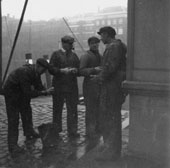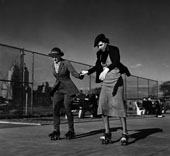




DESCRIPTION OF FILM
JANE LEVY REED, DIRECTOR'S BIOGRAPHY
NATHANIEL DORSKY, EDITOR'S BIOGRAPHY












SYNOPSIS
 My Eyes Were Fresh: The Life and Photographs of John Gutmann chronicles
the life and work of one of the seminal figures of twentieth-century
photography. Gutmann, who was part of the German Jewish diaspora that
helped transform American intellectual and artistic life starting in the
1930s, had a singular gift for creating powerful and often iconic images
with compelling emotional content. His visual embrace of the cultural
and social landscape of his adopted country is richly detailed in his
work and in this seductive film. The film allows Gutmann
to present his own story as well as the context for his
works through a series of six interviews that resonate with his
personality. He narrates the story of his early fascination with art and
his almost accidental introduction to photography as a powerful medium.
He also outlines the many decades he spent practicing his craft as the
stormy "American Century" unfolded and his new home emerged as a
powerful center of culture. Gutmann served as a vibrant link between the
European modernism of the early twentieth century and the burgeoning
artistic culture of the San Francisco Bay Area in the second half of the
century. His influence can be seen today in the works of many celebrated photographers.
My Eyes Were Fresh: The Life and Photographs of John Gutmann chronicles
the life and work of one of the seminal figures of twentieth-century
photography. Gutmann, who was part of the German Jewish diaspora that
helped transform American intellectual and artistic life starting in the
1930s, had a singular gift for creating powerful and often iconic images
with compelling emotional content. His visual embrace of the cultural
and social landscape of his adopted country is richly detailed in his
work and in this seductive film. The film allows Gutmann
to present his own story as well as the context for his
works through a series of six interviews that resonate with his
personality. He narrates the story of his early fascination with art and
his almost accidental introduction to photography as a powerful medium.
He also outlines the many decades he spent practicing his craft as the
stormy "American Century" unfolded and his new home emerged as a
powerful center of culture. Gutmann served as a vibrant link between the
European modernism of the early twentieth century and the burgeoning
artistic culture of the San Francisco Bay Area in the second half of the
century. His influence can be seen today in the works of many celebrated photographers.
Directed and produced by Jane Levy Reed and edited by Nathaniel Dorsky, My Eyes Were Fresh profiles an artist and teacher who made a lasting contribution to the history of modern photography. It is also a vivid portrait of the development of a unique artistic sensibility, one born out of the distinctive milieu of the modern German Jewish culture in Breslau and Berlin and shaped by the politics, popular culture, and emerging native modernism of the United States.
DESCRIPTION
In 1933, John Gutmann left behind a promising career as a modern painter in Germany to come to the United States. A student of the German Expressionist Otto Müller, he had flourished in the dynamic cultural world of Berlin. But by 1933, as a Jew, Gutmann was forbidden to work, teach, or even to exhibit his art. Encouraged by friends, he set out for the West Coast of the United States. With a new portable Rolleiflex camera in hand, he was determined to make his living as a press photographer by reporting back to Germany on the news and events of the nation. Gutmann had considerable success in the field of documentary and commercial photography—his pictures were published in numerous newspapers and magazines, and his work was exhibited in museums throughout the 1930s and 1940s. Soon after his arrival in San Francisco, Gutmann also began to teach. He secured an appointment at San Francisco State College in 1938 and remained active as an educator there until his retirement in 1973. For two generations of Bay Area artists and students, Gutmann was an influential and indispensable link to European modernist ideas.
Although he continued to make photographs and films through the 1950s and 1960s and intermittently published press photographs, there were no exhibitions or monographs of his work during this time. His early work was largely forgotten until the 1970s, when scholars and curators rediscovered Gutmann. Over the next three decades, his work was shown in major exhibitions at the San Francisco Museum of Modern Art (1976 and 1989), the M. H. de Young Museum (1995) and the Cantor Center for the Visual Arts at Stanford University (2000).
The title, My Eyes Were Fresh, sets the stage for the film's approach to the themes of artistic biography, a critical appraisal, and a close reading of Gutmann's pictures and filmic documents. The title is taken from an interview with Gutmann, in which he describes his arrival to the United States, his sense of awe at the technological exuberance and social variety of everyday life, and the way his Rolleiflex camera seemed to become an organic extension of his visual perception and an instrument of his curiosity.
My Eyes Were Fresh provides a richly textured view of the photographer and his ideas and times. Based on invaluable documentary footage of interviews with Gutmann and material drawn from the photographer's personal photographs of Breslau, Berlin, and San Francisco, the film is a close examination of the breadth of Gutmann's vision.
DIRECTOR'S BIOGRAPHY
Director, Executive Producer, Jane Levy Reed is active internationally as a filmmaker, curator, critic, and historian of photography. Reed has been producing and directing films since 1978. Her most recent film, "Pirkle Jones: Seven Decades Photographed – From Pictorial California to the Politics of the Black Panther Party," depicts Jones' long history of involvment that helped define the San Francisco Bay Areas dual traditions of elegant landscape imagery and biting social documentation. In 2006, Reed debuted her documentary on photographer John Guttman which was received with much acclaim and featured in many festivals both nationally and internationally. Reeds first film, "If Only For An Hour: American Popular Dance in the 40's," was released in 1978 and was sponsored by the Lincoln Center Dance Archive. She has worked on films with Shadow Light Productions since the early '80s. Among the exhibitions she has curated are David Bryne—Anima Mundi, San Francisco; Richard Barnes—Still Rooms and Excavations at San Francisco Camerawork; Josef Sudek—Poet of Prague at the Nikon Galleries in Tokyo and Osaka; L'esprit Metis, a traveling exhibition of eleven contemporary French documentary photographers; and David Ireland—Skellig, an exhibition, artist's book, and film at the Ansel Adams Center, San Francisco. In addition to organizing exhibitions, Reed has been a frequent editor of Camerawork: A Journal of Photographic Arts, and numerous other international photography journals.
EDITOR'S BIOGRAPHY
Editor Nathaniel Dorsky has been making and exhibiting films within the avant-garde arena since 1964. In recent years, his films have shown at numerous museums and festivals in the United States and Europe, including the Louvre, Paris; the Whitney Biennial, New York; the Pacific Film Archive, Berkeley; and a one-person show at the Walter Reade Theater of Lincoln Center, New York. In 2001, The Museum of Modern Art in New York dedicated a weekend to a twelve-film retrospective of his work. Dorsky lives in San Francisco and makes his livelihood as an editing consultant and film editor.
home | about the film | order DVD | DVD features | screenings | press | clip | links| home
Memory, 1939; Workers at Harbor, Rotterdam, 1933; Harbor at Rotterdam, 1933; Surveyors, Amsterdam Harbor, 1933; Promenade Deck, 1933; Self-Portrait, San Francisco, 1934; The Fleet Is In, San Francisco, 1934; First Drive-in Theater, Los Angeles, 1935; First Two Towers of the Bay Bridge, 1936; Majorette, San Francisco, 1939; Class (Olympic High Diving Champion, Marjorie Gestring), San Francisco, 1936; Strange Visitors, 1934; The Lesson, Central Park, New York, 1936.
©1998 Center for Creative Photography, Arizona Board of Regents
©2011-12 JLRFilm
info@jlrfilm.com